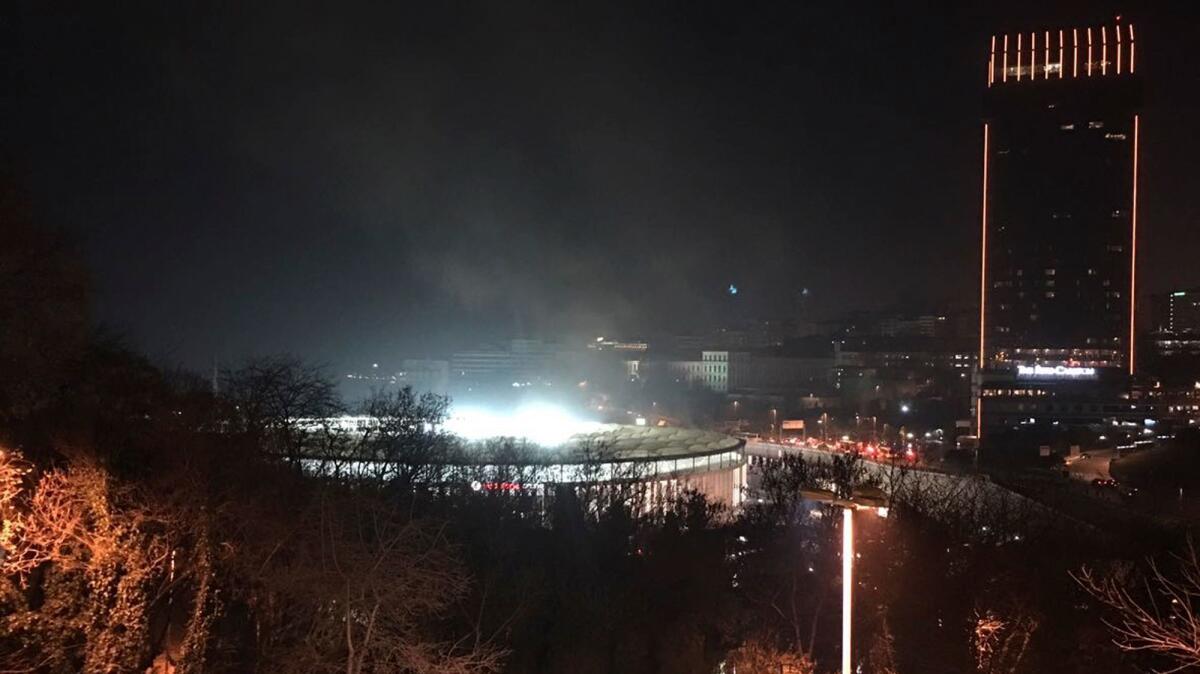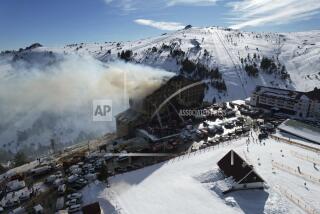Bombings targeting police kill 38 people and injure 155 near Istanbul soccer stadium

- Share via
Reporting from ISTANBUL, Turkey — A hard-line offshoot of the Kurdistan Workers Party, or PKK, took responsibility for a double bombing in Istanbul that killed 38 people, most of them police officers, and wounded 155 others.
The Turkish government declared a national day of mourning on Sunday, hours after the bombings near a soccer stadium guarded by a contingent of riot police. The blasts took place Saturday night, an hour and a half after a soccer match featuring the reigning national champions.
The PKK and the militant group Islamic State have carried out dozens of bombings in Turkish cities since July, killing 272 people, despite having little in common aside from antipathy for the Turkish government. The PKK wants to see the establishment of an independent Kurdish state, while Islamic State is clinging to its dream of an Islamic “caliphate” in the region.
The first of the two blasts at the stadium came from a car as it passed near the riot police. Authorities estimated that it carried a nearly 900-pound bomb, which sent a fireball into the sky that was seen and heard several miles away. It was followed 45 seconds later by another blast, which authorities have said came from a suicide bomber who was confronted by police in a park across the street.
The newly erected Vodafone Arena sits on the European side of the Bosporus, and videos shared on social media showed the fireball visible from across the water on the Asian side.
In another video, police shoot an individual firing an automatic weapon, seconds after the first blast.
White police helmets and riot gear littered the scene, beside the twisted remains of an armored police truck, a city bus and a minivan taxi.
Scores of ambulances rushed to the site after the explosions, and police and investigators blocked traffic for most of the night. Among those killed were 30 police officers and seven civilians, including workers at the stadium and a public bus driver. One person was not immediately identified.
The morning after the blast, hundreds carrying Turkish flags marched up the Bosporus seaside to the site of the attack, placing wreaths at the scene, a busy intersection in one of the city’s most upscale neighborhoods that is crowded with locals on most Saturday nights.
“My people should have no doubt that we will carry out the struggle against terror until the very end,” President Recep Tayyip Erdogan said while visiting the wounded in an Istanbul hospital on Sunday. “We put on our burial shrouds when we took this road.”
Erdogan was at a private residence a few miles away from the site of the attack when the bombs exploded.
The first funeral for those killed was held at the Istanbul police headquarters, where Erdogan and other leaders met with families of the dead.
“Have you accomplished anything beyond being the servants, pawns and hit men of certain dark forces, of your dark Western partners?” said Turkish Interior Minister Suleyman Soylu, addressing the PKK, which the Ankara government says receives support from U.S.-backed Kurdish militias in Syria and Iraq. “Have you gone past the point of living in caves like animals?”
Hundreds of flag-carrying men and women lined up for funeral prayers Sunday afternoon at Fatih mosque, a sight that has become increasingly common in Turkey.
The father of Kadir Yildirim, a police officer killed in the blast, stood silently as funeral-goers offered condolences.
“He was just 40 years old,” was all the elder Yildirim could manage to say, hands clasped at his waist, a card identifying him simply as “father” pinned to his jacket, as he stood before a coffin and half a dozen wreaths brought by business groups and local organizations.
The Interior Ministry announced that it had detained 13 suspects for questioning about the bombing, and six special prosecutors had been assigned to the investigation. Three people also were detained by Sunday evening for reportedly voicing support for the attack. Police said they would prosecute anyone who used social media to praise “terrorist organizations’ propaganda” or “legitimizing terrorism.”
In a statement posted to its website, the Kurdistan Freedom Falcons, or TAK, said the attack was carried out by two “heroic martyrs.” The group said the attack was in retaliation for the continued imprisonment of PKK founder Abdullah Ocalan, and the “fascism” of Erdogan’s Justice and Development Party.
“People should not expect life to be normal in Turkey. The people of Turkey must put a stop to this fascism,” the statement said.
TAK has claimed responsibility for a string of attacks in Turkish cities over the last year, including a June 2016 car bombing in Istanbul that killed 11 people, including police officers.
The PKK, whose decades-long insurgency has killed about 30,000 people, has said TAK operates independently of its command, but has stopped short of condemning the group’s actions.
About 2,400 people, including at least 372 civilians, have been killed since a two-year cease-fire between the PKK and Ankara, brokered by Ocalan, broke down in July 2015. Turkish security forces have put dozens of districts in the majority-Kurdish southeast under curfew since then, and about 400,000 civilians have been displaced by the fighting.
Urban areas in the southeast, including a historic district of Diyarbakir, a UNESCO World Heritage site, have been leveled.
A state of emergency has been imposed since a failed coup in Turkey on July 15, allowing authorities to hold terrorism suspects without charge for 30 days, close news outlets and appoint government trustees to replace locally elected officials.
Dozens of parliament members from the People’s Democratic Party, a pro-Kurdish party that acted as mediators for the now-collapsed government cease-fire with the PKK, are under arrest, some facing life imprisonment on charges of supporting the PKK, which Turkey and its allies in the North Atlantic Treaty Organization have listed as a terrorist organization.
On Sunday, opposition lawmakers as well as the ruling Justice and Development Party condemned the attack, while the People’s Democratic Party issued its own condemnation, saying “it is necessary to immediately end the politics, language and tone that produce more tension, polarization, hostility and conflict.”
The People’s Democratic Party has come under criticism in Turkey, after several of its lawmakers attended the funerals of previous PKK suicide bombers.
Ankara has repeatedly said it would like more support from Western powers in combating the PKK, which it claims relies on support from Kurdish militants in neighboring Syria and Iraq.
Hundreds of Turkish soldiers are in northern Syria, backing thousands of Free Syrian Army fighters, who are among the rebels seeking to overthrow the government of Syrian President Bashar Assad. Ankara has said the goal is to push both Islamic State and PKK-affiliated Kurdish groups from the Turkish border.
But Washington relies on the same Kurdish militants to fight Islamic State in Syria.
“Can you say that a terrorist is good because it is fighting against another terrorist?” Erdogan asked a NATO meeting in Ankara, the Turkish capital, in November. “Turkey is a barrier between the terror organizations and the rest of the world, especially Europe. If we fail in this fight, if this barrier falls, terrorists will cover the world with fire and blood,” he said.
Farooq is a special correspondent.
ALSO
Turkey’s ruling party moves to tighten Erdogan’s grip on power
Islamic State militants reenter Syria’s historic Palmyra
Pentagon will send 200 more troops to Syria
UPDATES:
3:20 p.m.: This article was updated throughout with staff reporting.
7:18 a.m.: This article was updated with a report that the Kurdistan Freedom Falcons, a Kurdish militant group, claimed responsibility for the bombings.
Dec. 11, 2:43 a.m.: This article was updated with the latest death toll and additional information about the potential perpetrators of the bombings.
9:40 p.m.: This article was updated with more information about the attack and arrests and comments from the White House National Security Council, EU foreign policy chief and other officials.
6:55 p.m.: This article was updated with revised death and casualty tolls and to report that 10 people were arrested in connection with the attack.
5:15 p.m.: This article was updated with revised death and casualty tolls, a statement from President Erdogan and comments from an eyewitness.
3:50 p.m.: This article was updated with more details about the explosions, a statement from the Besiktas sports club and the issuance of a temporary coverage ban by Turkey’s radio and television board.
This article was originally published Dec. 10 at 12:45 p.m.
More to Read
Sign up for Essential California
The most important California stories and recommendations in your inbox every morning.
You may occasionally receive promotional content from the Los Angeles Times.










